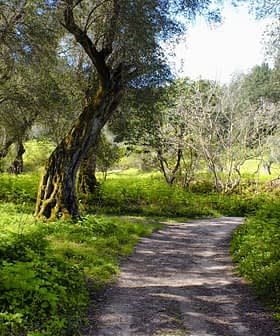Mapping the Polyphenols of Greek EVOOs for Healthy Aging
Extra virgin olive oils from Crete were found to contain the highest polyphenols load. Two-phase processing was also found to better preserves phenols in olive oil.
 The University of Athens
The University of AthensA new study categorized the extra virgin olive oils of Greece according to their load of polyphenols and further explored the effects of oleocanthal and oleacein on live organisms.
The study correlated polyphenols to healthy aging and also determined which cultivating method and processing procedure gives the best results in terms of yielding oils richer in polyphenols.
We cannot fight aging with our existing level of technology, but there are many possibilities of translating the results towards the so-called ‘healthy aging’, which is old age free of disease,
The researchers from the University of Athens and the University of Innsbruck, Austria, examined 134 extra virgin olive oils in total, focusing on their antioxidant component, the polyphenols (also called biophenols), and specifically oleocanthal and oleacein.
Despite their low presence in olive oil of only about five percent, polyphenols have long attracted the attention of scientists due to their strong antioxidant and anti-inflammatory properties and hypoglycemic action.
See Also:Olive Oil Health NewsAnd as the researchers noted, the plethora of the existing studies on biophenols is not enough to uncover all the ingredients of olive oil and their effects on human health, mainly due to the fact that olive oil is not a natural substance, but the product of a milling process, meaning it requires extended research and analysis.
The evaluated extra virgin olive oil samples were selected to cover all the producing territories of Greece, and also represented different varieties, cultivation methods, and processing procedures.
It was found that extra virgins from Crete, and especially from the areas of Lasithi and Heraklion, were the richest in polyphenols. The oils coming from the Aegean islands were above average, while the samples from the rest of the country were relatively low in their polyphenols load.
Furthermore, the extra virgin olive oils that were tested differentiated from each other in the quantity of the various types of phenols they contained.
“Each area had its own imprint of phenols,” Leandros Skaltsounis, the head researcher of the program, told the TOVIMA Science weekly publication. “Extra virgins from Messinia and Lakonia had the highest concentrations of hydroxytyrosol and tyrosol. For oleacein and oleocanthal, the champion seems to be Crete with an average of 93 milligrams per kilogram of olive oil, when the other areas had a concentration of around 47 milligrams per kilogram.”
The procedures used to process the olive drupes were also examined, and the results showed that the two-phase processing method is superior to the three-phase when it comes to better preserving the phenols load.
The water added during the malaxation in the three-phase processing, the researchers explained, partly strips the oil of its beneficial compounds by sweeping away some of the polyphenols with waste water.
The study was also the first to shed light on the effect of cultivation practices on the polyphenols in olive oil. It was deduced that integrated cultivation yields olive oils with the highest level of polyphenols, followed by the organic and then conventional cultivation.
An integrated cultivation is a type of sustainable farming with a holistic approach to growing olive trees and processing the olives by taking into account all the relevant parameters, like the quality of the produced olive oil, the fertilizers used, the amount of water spent for irrigation, the energy required and much more.
After mapping the extra virgin olive oils of Greece according to their pack of polyphenols, the study was stretched to test the effects of oleocanthal and oleacein in live cells, first by injecting them into human skin fibroblasts and then to a number of flies of the Drosophila strain.
It was found that the addition of the substances in the human cells and the live flies had results that significantly promoted healthy aging by increasing their triglycerides, and also by improving their inflammatory status. At the same time, it reduced the oxidative stress of the flies and slowed down their mobility depletion, which is an important index of aging.
“We cannot fight aging with our existing level of technology, but there are many possibilities of translating the results towards the so-called ‘healthy aging,’ which is old age free of disease,” said Ioannis Tsougakos, one of the researchers.
“We tried to extend the life of the protective mechanisms of live organisms that fight toxic molecules, as these mechanisms tend to under-function in old age,” he added.
The researchers also created a transgenic model of Drosophila that imitated obesity and Type 2 diabetes of humans. They discovered that by enriching the food of the transgenic flies with oleocanthal and oleacein, they could extend their expected lifespan.
“The next stage is to further study the intervention mechanism that the substances use at a molecular level, and reaffirm our findings using more in vivo models,” Tsougakos said. “We also consider designing a preliminary clinical study on healthy people and even on obese and diabetic people.”








